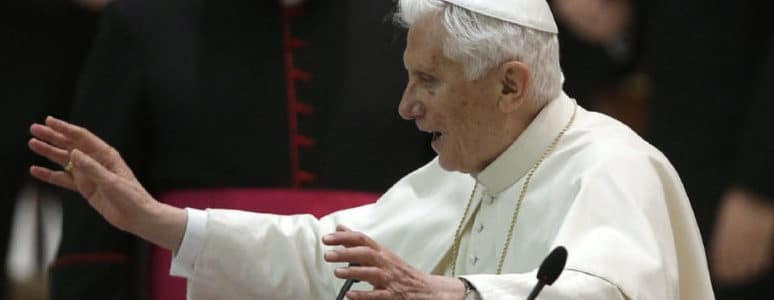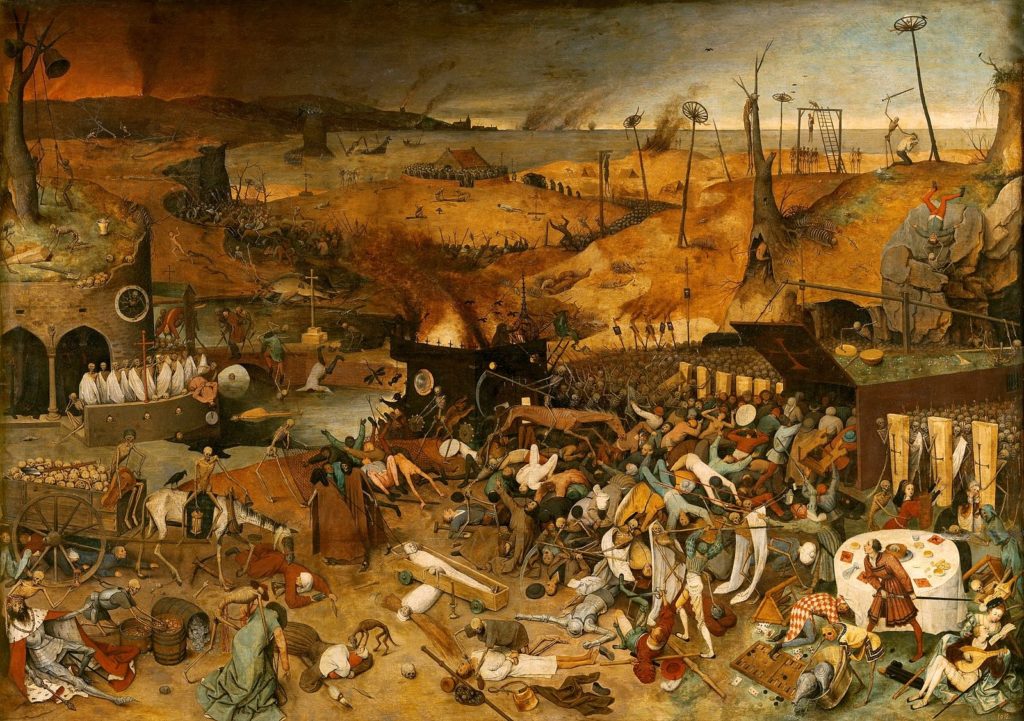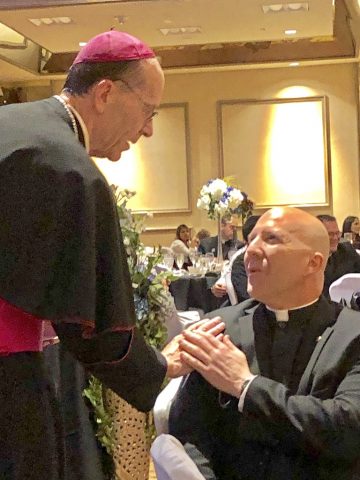Are All the World’s Problems the Responsibility of America? by Patrick Buchanan
May 11, 2019‘God Weeps’: Catholic Leaders Help Community Cope With STEM School Shooting, by Mary Rezac
May 11, 2019
By Fr. Shenan J. Boquet, Human Life International, May 6, 2019
‘You Were Made for Greatness’
“The world offers you comfort, but you were not made for comfort. You were made for greatness!” This is a quotation often attributed to Pope Benedict XVI.
There is some debate about whether the pope ever said precisely these words. However, it is quite clear that he often said extremely similar things. For instance, in comments to some German pilgrims in 2005, Pope Benedict stated: “Christ did not promise an easy life. Those who desire comforts have dialed the wrong number. Rather, he shows us the way to great things, the good, towards an authentic human life.”
In his encyclical Spe Salvi, the Holy Father further clarified the nature of the greatness that humans are called to. “Man was created for greatness—for God himself; he was created to be filled by God.” But, added the pope, “his heart is too small for the greatness to which it is destined. It must be stretched.”

Pope Benedict XVI Courtesy: AP’s Alessandra Tarantino)
This stretching of the heart is not easy, noted the pope. “This requires hard work and is painful.” In order to become “suited to that for which we are destined,” it is necessary to pursue a life of intense prayer. “When we pray properly, we undergo a process of inner purification which opens us up to God and thus to our fellow human beings as well,” he added. “In prayer we must learn what we can truly ask of God—what is worthy of God…We must learn to purify our desires and our hopes.”
It is sometimes astonishing how few leaders grasp this fundamental truth of human psychology: that the human desire to live a comfortable, easy life is, in fact, extremely superficial. Far deeper than this desire, is the desire that most people have to commit their lives to doing difficult things in pursuit of something truly meaningful: to achieve “greatness”. Truly great leaders – like Pope Benedict – are those who understand this this, who know that, deep down, people are yearning not to be comforted and told that they’re just “fine” as they are, but rather to be shown the rough and rocky path to overcoming their narrow selfishness and to become the best possible versions of themselves.
Bishop Olmsted’s Challenge to Leaders
These thoughts are provoked by the recent speech given by Bishop Thomas Olmsted at the National Catholic Prayer Breakfast. The speech is extraordinary, for many reasons. Indeed, if this column only convinces you to go read the entire speech for yourself, then it will have done its job.
What stands out the most is how firm the bishop’s speech was. Rather than the sort of spiritual clichés and psychological platitudes that we are, sadly, all-too accustomed to hearing from our political leaders and from our pulpits, Bishop Olmsted eschews comfortable words, in favor of a rousing battle cry to spiritual greatness. It is a speech you can “sink your teeth into”; it is full of solid doctrine and solid spirituality, and the sort of prophetic urgency that Catholics need so desperately.
Echoing the words of Pope Benedict, Bishop Olmstead proclaimed to the Catholic leaders gathered at the prayer breakfast: “Christians are called not to complacency, but to greatness: to have hearts great enough to be filled with God. We are called to be saints, saints with lives full of the Holy Spirit, women and men who live heroic virtue.”
Although the bishop’s speech deals with difficult themes – abortion, gender ideology, the Catholic Church’s sex abuse scandal, sin, the devil, persecution, scandal – there is nothing depressing about his words. Quite the contrary. His speech is suffused with an inspiring and infectious hope: not a syrupy hope, but one rooted in a firm grasp of the nature of Christ’s promises to us, and belief in the reality of Christ’s resurrection.
“Christ is risen! He is truly risen!” Bishop Olmsted began. Faith in Christ’s crucifixion and resurrection, he said, preserves us from the opposing sins of presumption and despair. “The enemy of our souls does not care which of these we prefer, either narcissistically to look in the mirror or pathetically to fret as we look out the window,” he said. “Either way, the roaring lion finds what he is looking to devour: either someone stupidly self-confident and alone, or someone paralyzed by fear of failure.”
Not forgetting that he was speaking to a roomful of Catholic leaders, the bishop warned that when the person whom the devil seduces is a leader of others, his “devouring of one soul can become a feast on many.” This is a chilling, but timely reminder, at a time when our political and spiritual leaders are so often immured in scandal.

“The Triumph of Hell,” Pieter Brughel, circa 1562
When those in authority over others – whether they are the presidents of powerful nations, bishops of dioceses, pastors of parishes, or mothers and fathers of families – fail to live up to the call to greatness, it is often others who pay the price. Nowhere is this truth more evident than in the Church’s sex-abuse scandal, which has done irreparable spiritual damage.
How refreshing, then, to hear Bishop Olmsted facing the spiritual fall-out of this scandal head-on! No excuses. The laity, he said, are “justly angered at the revelations of so much sin and failure-in-leadership among priests and bishops of our beloved Church. Your concerns are just and need to be answered with both sacrifice and actions that are wiser than despair.”
“Please pray for us, your shepherds,” he said, “that we might act with radical trust in the grace of the Risen Christ to bear any burden that comes with offering healing for the victims, honestly naming the evil, clearly defending inconvenient truths of the Gospel and exercising decisive leadership in Christ’s Name.”
Bishop Olmsted notes that he was ordained the same year that the Supreme Court legalized abortion in the Roe v. Wade decision. “Throughout my life and ministry, then, walking in the dark shadow cast by the infamous Supreme Court decision, Christ has been summoning me to lift up the truth proclaimed by the Second Vatican Council that abortion is an ‘unspeakable crime’ (Gaudium et Spes, ¶51).”
“It is my pastoral duty to bear witness to the Gospel of Life, and to pray and work for a restored protection in law of the most vulnerable among us,” he added. “I do so with undying hope because, as St. Paul wrote, ‘…the love of Christ impels me.’”
At Human Life International, we have always believed that, in our day, the attack on human life and the family is at the epicenter of the battle between the Kingdom of God, and that of the devil. Bishop Olmsted too places the battle against these twin evils front and center. Catholics, he said, must “stand up for each child” as well as the “reality of marriage,” both in our own homes and in the public sphere, “despite the real risk of persecution by doing so.”
The attacks on the unborn child and marriage are both represented in gender ideology, he stated, at the root of which is a rejection of our human bodiliness. Christ embraced and redeemed the human body by taking upon Himself human flesh. However, warned the bishop, “Any rejection of bodiliness will immediately target two beautiful but demanding and sometimes inconvenient realities: marriage and the child.”
Bishop Olmsted drew attention to the scandal of U.S. politicians’ opposition to the Born Alive Abortion Survivors Act – a bill that would require doctors to provide life-saving care to newborn infants who have survived failed abortions. “Where does this blatant disregard for a child’s life come from?” he asked. “From a hardened heart. A child needs love, and love costs; and the human heart must be prepared to pay the cost of love when the child arrives.”
Rather than emphasizing grand political solutions, however, Bishop Olmsted focuses on the place where the rubber truly hits the road: in individual hearts and homes. To the mothers and fathers in the audience, he issued the following challenge: “[Y]ou, the heads of our domestic churches, the smallest and most vital cells of the Church and of society, have as your primary responsibility to be ‘all-in’ for your sacramental marriage vows. This entails an extraordinary openness to the gift of new human life, whether the child arrives by way of the marital act or via the generous fostering and adoption of children who have no parents.”
“Lead your family,” he added, “and lead in whatever other place the Lord asks, with deep and childlike faith in Him. Trust in God the Father who loves you, in His Son who frees you by His saving death and glorious Resurrection; He fills you with the Faith, Hope and Love you need to be leaders in the Name of the Risen Christ.”
“Brothers and sisters in Christ, we can do this,” he challenged. “We were made for such a time as this. God destined us for these historical circumstances. May we be ready, each day, to say with Isaiah, ‘Here I am, Lord, send me.’”
St. Ignatius of Antioch once stated that the bishop is typos tou Patros – that is, the living image of God the Father. In Bishop Olmsted’s speech I find the sort of words that one might expect from a loving father: unyielding on principles but suffused with an authentic love that comes of a concern for the welfare of those under his care. I hope you will join me in praying every day for Bishop Olmsted, and all other bishops of the world, that they may indeed by typos tou Patros.









